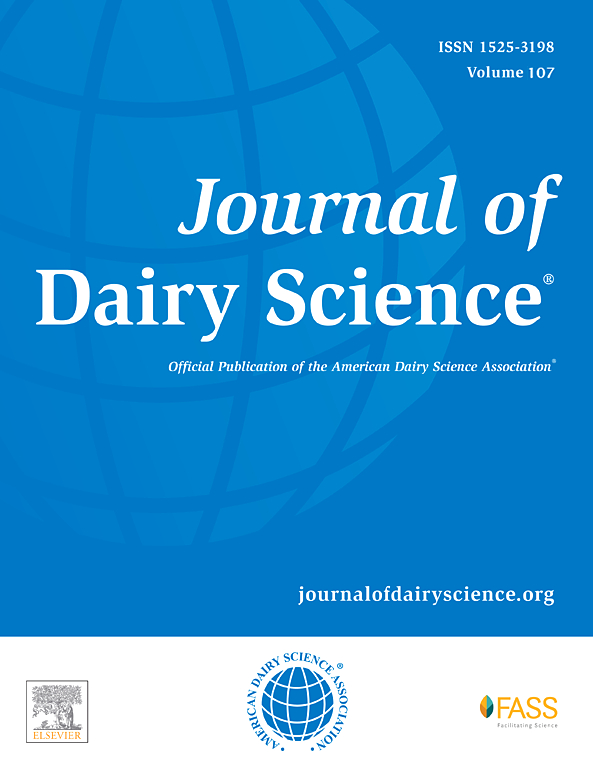Potential involvement of peroxisome proliferator-activated receptors in the inhibition of mammary lipid synthesis during diet-induced milk fat depression
IF 3.7
1区 农林科学
Q1 AGRICULTURE, DAIRY & ANIMAL SCIENCE
引用次数: 0
Abstract
The objective of this study was to evaluate the possible role of the peroxisome proliferator-activated receptors (PPAR: PPAR-α, PPAR-β/δ, and PPAR-γ) in diet and CLA-induced milk fat depression (MFD) in dairy cows. We hypothesized that the expression of PPAR, which regulate lipid metabolism and bind to PUFA, could be modulated by biohydrogenation intermediates that induce MFD, thereby interfering with milk fat synthesis. First, tissue profiling revealed that PPAR-α and PPAR-β/δ had low expression in mammary tissue compared with the liver. A comparison of lactating and nonlactating tissue from the same cows showed that expression of all 3 PPAR isoforms did increase during lactation. Mammary expression of the PPAR family during MFD was then observed in 9 mid-lactation cows in a 3 × 3 Latin square design with MFD induced by a 3-d intravenous infusion of trans-10,cis-12 CLA or feeding a high-oil and low-forage diet. The expression of all 3 PPAR isoforms remained largely unaltered during CLA and diet-induced MFD, except for an increase in PPAR-α target genes CPT1A and ACADVL that are involved in β-oxidation. The interaction of PPAR-γ chemical agonist troglitazone and antagonist T0070907 and CLA was then investigated in bovine mammary epithelial cells. The activation and inhibition of PPAR-γ did not overcome trans-10,cis-12 CLA inhibition of lipogenesis despite the agonist stimulating PPAR-γ expression. Furthermore, PPAR-γ activation did not modify the expression of lipogenic genes. Overall, the results fail to support a functional role of the PPAR family in the inhibition of lipogenesis during MFD in dairy cows.
PPARs可能参与了饮食诱导乳脂抑制过程中乳脂合成的抑制作用。
本研究的目的是评估过氧化物酶体增殖激活受体(PPARs:PPAR-α、PPAR-β/δ和PPAR-γ)在饮食和共轭亚油酸(CLA)诱导的奶牛乳脂抑制(MFD)中可能发挥的作用。我们假设,PPAR 可调节脂质代谢并与多不饱和脂肪酸结合,其表达可能会受到诱导 MFD 的生物氢化中间产物的调节,从而干扰乳脂的合成。首先,组织分析表明,与肝脏相比,PPAR-α 和 PPAR-β/δ 在乳腺组织中的表达量较低。对同一奶牛的泌乳组织和非泌乳组织进行比较后发现,PPARs的表达在泌乳期确实有所增加。然后,在 3x3 拉丁正方形设计中观察了 9 头泌乳中期奶牛乳腺发育期间 PPARs 的表达情况,通过 3 天静脉注射反式-10,顺式-12 CLA 或饲喂高油/低贮存饲料诱发乳腺发育。在CLA和日粮诱导的中膜炎期间,除了参与β氧化的PPAR-α靶基因CPT1A和ACADVL有所增加外,其他PPARs的表达基本保持不变。然后在牛乳腺上皮细胞(MAC-T)中研究了 PPAR-γ 化学激动剂曲格列酮和拮抗剂 T0070907 与 CLA 的相互作用。尽管激动剂能刺激 PPAR-γ 的表达,但 PPAR-γ 的激活和抑制并不能克服反式-10、顺式-12 CLA 对脂肪生成的抑制作用。此外,PPAR-γ 的激活并没有改变脂肪生成基因的表达。总之,研究结果未能支持 PPAR 在奶牛中频发情期间抑制脂肪生成的功能性作用。
本文章由计算机程序翻译,如有差异,请以英文原文为准。
求助全文
约1分钟内获得全文
求助全文
来源期刊

Journal of Dairy Science
农林科学-奶制品与动物科学
CiteScore
7.90
自引率
17.10%
发文量
784
审稿时长
4.2 months
期刊介绍:
The official journal of the American Dairy Science Association®, Journal of Dairy Science® (JDS) is the leading peer-reviewed general dairy research journal in the world. JDS readers represent education, industry, and government agencies in more than 70 countries with interests in biochemistry, breeding, economics, engineering, environment, food science, genetics, microbiology, nutrition, pathology, physiology, processing, public health, quality assurance, and sanitation.
 求助内容:
求助内容: 应助结果提醒方式:
应助结果提醒方式:


